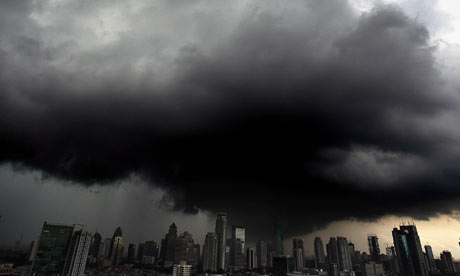 A century of whaling may have released more than 100 million tonnes - or a large forest's worth - of carbon into the atmosphere, scientists say. Whales store carbon within their huge bodies and when they are killed, much of this carbon can be released.
A century of whaling may have released more than 100 million tonnes - or a large forest's worth - of carbon into the atmosphere, scientists say. Whales store carbon within their huge bodies and when they are killed, much of this carbon can be released.
US scientists revealed their estimate of carbon released by whaling at the Ocean Sciences meeting in Portland, US. Dr Andrew Pershing from the University of Maine described whales as the "forests of the ocean". Dr Pershing and his colleagues from the Gulf of Maine Research Institute calculated the annual carbon-storing capacity of whales as they grew.
Whaling worsens carbon release, scientists warn
Asia-produced ozone making its way to U.S., study finds
 A new study further bolsters concerns that pollution blowing across the Pacific Ocean from China and other rapidly developing Asian nations may swamp efforts to clean up the air in the Western United States and make it difficult for states and cities to meet federal standards.
A new study further bolsters concerns that pollution blowing across the Pacific Ocean from China and other rapidly developing Asian nations may swamp efforts to clean up the air in the Western United States and make it difficult for states and cities to meet federal standards.
The study, based on 100,000 measurements over 25 years and a computer model tracking air-flow patterns, found that during the spring, ozone from Asia reaches Washington, Oregon, California and other states west of the Rocky Mountains.
Almost half of all primates face 'imminent extinction'
 Almost half of the world's primate species – which include apes, monkeys and lemurs - are threatened with extinction due to the destruction of tropical forests and illegal hunting and trade.
Almost half of the world's primate species – which include apes, monkeys and lemurs - are threatened with extinction due to the destruction of tropical forests and illegal hunting and trade.
In a report highlighting the 25 most endangered primate species, conservationists have outlined the desperate plight of primates from Madagascar, Africa, Asia and Central and South America, with some populations down to just a few dozen in number.
World's top firms cause $2.2tn of environmental damage, report estimates
 The cost of pollution and other damage to the natural environment caused by the world's biggest companies would wipe out more than one-third of their profits if they were held financially accountable, a major unpublished study for the United Nations has found.
The cost of pollution and other damage to the natural environment caused by the world's biggest companies would wipe out more than one-third of their profits if they were held financially accountable, a major unpublished study for the United Nations has found.The report comes amid growing concern that no one is made to pay for most of the use, loss and damage of the environment, which is reaching crisis proportions in the form of pollution and the rapid loss of freshwater, fisheries and fertile soils.
More...
Fabricated quote used to discredit climate scientist
 For climate
For climate
sceptics it was a key piece of evidence showing that the scientists behind global warming could not be trusted. A quotation by one of the world's most eminent climate scientists was supposed to demonstrate the depths to which he and his ilk would stoop to create scare stories exaggerating the threat of global warming.
"Unless we announce disasters, no one will listen," Sir John was supposed to have said in 1994.
Tritium hot zone expands
 The Department of Health said late Monday there appears to be "a very large area" at the Vermont Yankee nuclear reactor contaminated with radioactive tritium, and contamination levels continue to rise.
The Department of Health said late Monday there appears to be "a very large area" at the Vermont Yankee nuclear reactor contaminated with radioactive tritium, and contamination levels continue to rise.
Because the area is so big, according to William Irwin, radiological health chief, there are many potential sources of radioactive water at this particularly high concentration of tritium.
TVNL Comment: Sure Obama, let's build more nuclear power plants! Let's risk ALL life on Earth!
Chevron hires twelve public relations firms to discredit indigenous Indians in Ecuador
 In response to an environmental lawsuit filed against the oil giant, Chevron has fortified its defenses with at least twelve different public relations firms whose purpose is to debunk the claims made against the company by indigenous people living in the Amazon forests of Ecuador. According to them, Chevron dumped billions of gallons of toxic waste in the Amazon between 1964 and 1990, causing damages assessed at more than $27 billion.
In response to an environmental lawsuit filed against the oil giant, Chevron has fortified its defenses with at least twelve different public relations firms whose purpose is to debunk the claims made against the company by indigenous people living in the Amazon forests of Ecuador. According to them, Chevron dumped billions of gallons of toxic waste in the Amazon between 1964 and 1990, causing damages assessed at more than $27 billion.
More Articles...
Page 171 of 200

 Environmental Glance
Environmental Glance






























